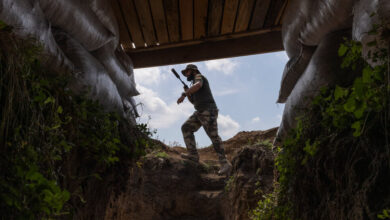Long on Europe’s Fringe, Poland Takes Center Stage as War Rages in Ukraine

WARSAW — After the White House announced this week that President Biden would visit Poland, the Kremlin let rip with a belligerent tirade: Polish leaders were a “vassal” of the United States, gripped by “pathological Russophobia,” and their country a “community of political imbeciles.”
Instead of fearful jitters, however, the broadside by Dmitri A. Medvedev, deputy head of the Kremlin’s security council, stirred a burst of pride in Warsaw.
“This is further proof that the Russians treat Poland seriously and see its growing importance in the West,” said Stanislaw Zaryn, director of the Department of National Security and spokesman for the coordinating minister for security.
Russia’s rage and President Biden’s decision to make Poland his only European stop on Friday and Saturday after summit meetings in Belgium reflect a new reality created by the war in Ukraine: Poland is suddenly the pivot around which many of the West’s hopes and Russia’s fury turn.
Shaking off, or at least obscuring, its reputation as Europe’s inveterate troublemaker, Poland’s right-wing populist government has now taken center stage, embraced by both Brussels and the United States as a linchpin of Western solidarity and security. It shows no sign of retreating from its many fights with the European Union, but Poland, which has also quarreled with Washington, has repositioned itself as an indispensable and a trusted ally.
“Poland is the center of gravity. Just look at the map,” said Jacek Bartosiak, founder of Strategy and Future, a Warsaw research group. “Without Poland there is no NATO eastern flank.”
To fortify that flank, the Pentagon has sent more than 5,000 additional troops and Patriot surface-to-air missile batteries to Poland, more than doubling the number of U.S. military personnel in the country.
On Wednesday, Poland said it had identified 45 Russian diplomats as spies, all of whom had been ordered to leave the country.
The deputy foreign minister, Pawel Jablonski, said Poland could not tolerate Russia’s abuse of its embassy in Warsaw when Moscow “is waging a barbaric war against Ukraine.” Spies disguised as diplomats, he added, not only “pose a threat to Poland’s security, but also to the security of Ukrainian citizens staying in Poland. Hence this decision.”
Previously scolded by Brussels for its hostility to migrants, Poland has over the past month welcomed more than two million refugees fleeing the war next door in Ukraine, far more than any other country. It has also become a vital staging post for the supply of weapons, ammunition, fuel and other assistance to Kyiv and put itself at the center of deliberations shaping the West’s response to the crisis.
Warsaw has become the capital through which all diplomatic, military and humanitarian roads to Ukraine now pass.
And the Polish government, which earlier infuriated Washington by pushing through legislation, later vetoed by the president, that threatened an American-owned television network, is basking in the glow of appreciative attention. In recent weeks, it has received visits and praise from Vice President Kamala Harris; the head of the C.I.A., William Burns; Defense Secretary Lloyd J. Austin III; the president of the European Council, Charles Michel; and a host of other senior U.S. and European officials.
Jake Sullivan, President Biden’s national security adviser, on Tuesday described Poland as a “frontline and very vulnerable ally” that “has taken the brunt of the humanitarian impact outside of Ukraine.”
Poland’s sudden prominence as NATO’s most exposed frontline state has stirred alarm that it could be sucked into the conflict, particularly after Russian missiles last week obliterated a Ukrainian military base near the border. Among those most worried are some of the Ukrainians who fled to escape fighting at home.
“Poland is too close. I want to get out of here,” said Yevgeny Pyskuko, a music teacher who fled to Poland after Russian forces attacked a huge nuclear power station near his home in southwestern Ukraine. “I want to go across the ocean. It is not safe here,” he added.
Despite the possible risks, Poland has been in the forefront of rallying Europe to take tough measures to punish President Vladimir V. Putin for his aggression.
When Germany, stunned by Russia’s invasion of Ukraine on Feb. 24, weighed whether to preserve the longstanding pillars of its security and foreign policy toward Russia, Poland’s prime minister, Mateusz Morawiecki — who just a few weeks earlier had attended a conclave of Putin-friendly populists in Madrid — flew to Berlin to personally “shake Germany’s conscience” and stiffen its resolve against Moscow.
Soon after Mr. Morawiecki’s trip to Berlin, the German government dropped its earlier resistance to sending weapons to Ukraine and to ejecting key Russian banks from a money transfer network known as SWIFT.
Poland’s deputy culture minister, Jaroslaw Sellin, a conservative firebrand who previously relished his country’s role as Europe’s great disrupter, has found a new cause celebrating Poland’s favor at the center of attention. “Everyone watches us with admiration,” he told Radio Gdansk on Tuesday.
Long-running squabbles with the European bloc over the rule of law, L.G.B.T.Q. rights, coal mining and various other issues still rumble in the background and the government’s critics worry that instead of curbing what they see as a steady demolition of democratic norms by the governing party, Law and Justice, Poland’s newfound favor will only embolden the government.
“We are in this respect another victim of the war,” lamented Roman Kuzniar, a professor at Warsaw University who advised the country’s previous pro-European governments before Law and Justice took power in 2015. “War always helps those who are ruling a country. It would be too bad if both the European Union and the United States forget about all the wrong things that this government has done and is doing,” he added.
Russia-Ukraine War: Key Developments
A new diplomatic push. President Biden, in Brussels for a day of three summits, announced that the United States will accept 100,000 Ukrainian refugees and donate $1 billion to help Europe take in people fleeing the war. He also raised the possibility of Russia’s removal from the Group of 20.
NATO deployment. NATO’s chief, Jens Stoltenberg, said that the alliance would double the number of battlegroups in its eastern flank by deploying four new battlegroups in Bulgaria, Hungary, Romania and Slovakia, a significant bolstering of NATO’s presence in the region.
Russia’s shrinking force. Western intelligence reports and analyses indicate that Russian forces remain stalled across much of the Ukrainian battlefield. The Pentagon previously said that Russia’s “combat power” in Ukraine is now below 90 percent of its original force.
On the ground. The Ukrainian forces, which are several days into a counteroffensive, claimed to have destroyed a Russian landing ship at a southern Ukrainian port city in Russian-occupied territory.
For the moment, however, security issues have trumped the governing party’s image as a disruptive force obsessed with stoking culture wars and hostility to foreigners, particularly migrants, bureaucrats in Brussels and Germans.
“The government focused too much on stupid things instead of more important things like security,” Mr. Bartosiak said. “But now everybody in Poland sees what matters.”
Supported in Parliament by even its fiercest political enemies, Law and Justice last week enacted a new Homeland Defense Act that will increase military spending to 3 percent of gross domestic product, from around 2.2 percent.
Poland was already one of only 10 countries in the 30-member NATO alliance that met a minimum spending target of 2 percent.
Polish foreign policy, preoccupied until the war in Ukraine with efforts to form a bloc of like-minded conservative and often pro-Kremlin European populists who share its hostility to Brussels, is now working to cement a new bloc of European countries pushing for tougher sanctions against Russia, including the Baltic states and the Czech Republic.
At a meeting of European foreign ministers this week in Brussels, Poland joined Lithuania and other countries on Europe’s eastern fringe that have a long and painful experience of Russian aggression in lobbying hard for a ban on oil imports from Russia. The effort failed in face of strong opposition from Germany, the Netherlands and others, but it put Warsaw at the center of an emerging bloc of nations determined to punish Mr. Putin for invading Ukraine.
It has also sundered Poland’s close partnership with Hungary, which opposes further sanctions and whose proudly illiberal prime minister, Viktor Orban, shares the Polish governing party’s view on Brussels but has a long record of cozying up to the Kremlin.
Sophie Pornschlegel, a senior policy analyst at the Brussels-based European Policy Center, said the Polish government was using the crisis for its own benefit. Despite Poland making no real changes to policies that put it on a collision course with Brussels, she said, the European Commission, the bloc’s executive arm, is likely to be “rather lenient due to Poland’s position welcoming so many refugees.”
Poland’s shift, and particularly its welcoming of refugees, has been greeted warmly by many in the European Union.
In early March, Mr. Michel, the president of the European Council, a powerful body that ultimately decides the bloc’s direction but that has frequently struggled to find unity because of Poland and Hungary, visited Rzeszow, a Polish city near the border with Ukraine, along with the Polish prime minister.
“I would like to commend you, dear Prime Minister Mateusz, your team, and the Polish people,” Mr. Michel gushed.
Monika Pronczuk contributed reporting from Brussels.





